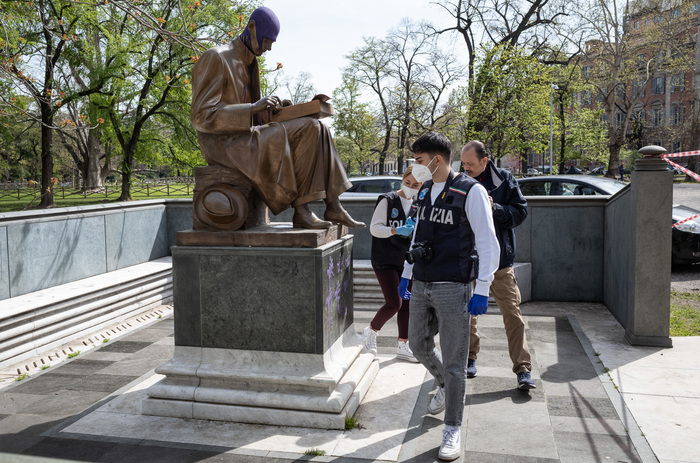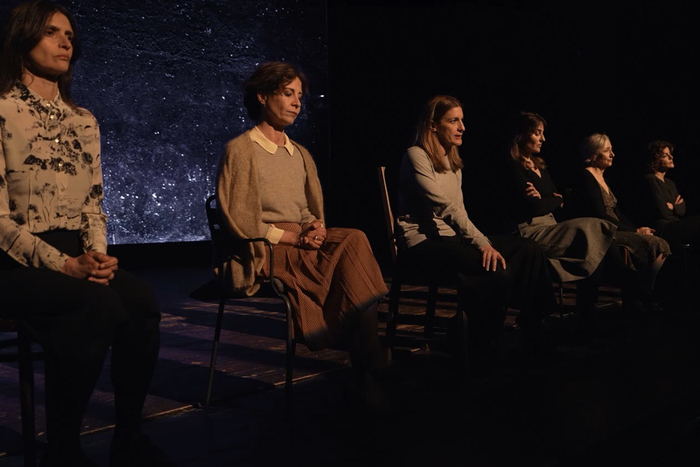Enlarge image
The writer Maaza Mengiste at the Festivaletteratura in Mantova, Italy
Photo: imago images / Independent Photo Agency
Maaza Mengiste is visibly delighted when she receives her interview at the hotel: she can finally begin her reading tour with her book "The Shadow King". The original book came out at the height of the pandemic and was shortlisted for the prestigious Booker Prize 2020.
Mengiste was born in Addis Ababa in 1971, left Ethiopia as a toddler, grew up in Nigeria, Kenya and finally in the USA. Today she lives in New York. Her first novel "Under the Eyes of the Lion" is dedicated to the aftermath of the military coup in 1974 that drove her family out of Ethiopia. In her second novel, Mengiste tells the story of Hirut, an orphaned young Ethiopian woman who works as a kind of maid and goes to war. In 1935, fascist Italy invaded Ethiopia - and used poison gas in the process. The Italian attack started with a pincer offensive without a declaration of war, it was to be the last and largest colonial conquest in Europe. Mengiste deals with the role of women in this war in her novel.
SPIEGEL:
Ms. Mengiste, when did you first hear about the women who fought alongside the men against the Italian fascists in Ethiopia in 1935?
Mengiste:
Nobody told me about it.
During my childhood, of course, I heard stories about the men in my family or the neighborhood.
At family celebrations, conversations often started like this: This is the daughter of the man who fought there.
So I only knew these stories in connection with men.
SPIEGEL:
And how did you come across women?
Mengiste:
Through research.
I read about a woman who had her rifle during the war
deceased husband and then led his men, and later by another who was called up for military service.
I found these lines by accident.
After that, I had to completely rewrite the story, even though I had already finished a first version of the book by then.
SPIEGEL:
Did you also do research in your own family?
Mengiste:
When I went to Ethiopia to do a little research, my mother was with me.
At the end of the trip I told her about the photos I had found that showed women soldiers.
She then said very casually: What about your great-grandmother?
SPIEGEL:
Why do you think your mother didn't talk to you about it earlier?
Mengiste:
Because I never asked for it.
My mother and aunts knew these stories because they are told in the rooms where women come together - the kitchens, the bedrooms.
But that doesn't count as an official part of historiography.
SPIEGEL:
Did you discover something in your research that surprised you?
Mengiste: Most of the
information about this war is in fascist archives, but of course it's all propaganda.
I wasn't entirely sure how to find out the "real story" that I thought existed.
And then something incredible happened.
When I was on a reading tour for my first book, I was reading in a small Italian bookstore.
At the end of the event, a man stood up and said, “I would like to apologize.” The people in the audience asked him to sit down again, whereupon he got emotional and said, “I want to tell you that my father was a pilot in the war and dropped the gas bombs.
How can I ever ask your forgiveness? ”He began to cry.
SPIEGEL:
How did you react?
Mengiste:
At the time I didn't know what to say, it was completely unexpected.
But I told him that forgiveness begins with conversations like this.
He then handed me a book he had published himself, in which his father's letters were printed.
He also gave me photos and diaries and just said to me: do what you want with them.
SPIEGEL:
What did you do with the material?
Mengiste:
I started to look at everything, to read, and what came out of it was the "real war". It was also the war of these young Italian men who had never been so far from home and who were now experiencing something completely new. It was about the communities, but also about the friendships they had. It was about the complicated relationships that were beginning to develop between Italians and East Africans.
All of this could be seen in this man's work.
So I decided to stop looking in the archives and instead look around in antique shops.
I went to flea markets all over Italy and made friends with some sellers.
At every market there is always a fascist table with devotional objects on the weekends.
So I looked for Mussolini's likeness and always ran straight towards it.
(
laughs
).
I started collecting these photos and letters.
SPIEGEL:
Did you have similar personal encounters afterwards?
Mengiste:
Some, yes. After a lecture, a man gave me an old newspaper clipping from 1936 about the funeral of his father, who is buried in Ethiopia. Both stories made some things clear to me. These men were fathers, they were sons, they were loved and they loved. I think there is room in people for both the history of Ethiopian women and that of Italian men. And that's what I wanted to convey. Incidentally, the Ethiopians also have their own story about this war, which supposedly consisted of bravery and courage. But I know that was not the case. So I wanted to break this propaganda for both sides and uncover the real stories.
SPIEGEL:
In the book, for example, you also describe in great detail the relationship between the Italian photographer and soldier Ettore and his sadistic Colonel Fucelli.
Mengiste:
The war did not only take place on one side, but private wars were also waged on both sides.
I'm interested in what cruelty and violence look like.
This question drives me from one book to the next.
And it would have been very easy for me to depict Italian figures in one or two dimensions, to create them as stereotypical fascist soldiers.
But that's uninteresting.
And that's not the world that existed then.
I believe that even the cruelest characters have a line they can't cross.
As a writer, I want to find out where that line is.
SPIEGEL:
We know from Italian fascism how important the visual component was for propaganda.
In your book you also describe photographs, both of the Italian soldiers and of Ethiopians. But you seem to look at the pictures differently, recognize gestures of patience, accusation, eternal condemnation.
Mengiste:
I really saw these photos as a first step.
When looking at the pictures I often thought that the photographers could never imagine that someone like me would look at these photos.
I don't look at these pictures directly, but from a different angle, read them differently.
Because I'm trying to find out what else is going on in the picture, what this person might be feeling, what clues there are in the picture that could tell me a different story.
These photos are not only portraits of East African women, but also of the photographer himself.
SPIEGEL:
You spent some time in Italy.
How do you look at this Italian heritage?
Mengiste:
It still seems difficult, inconvenient to talk about.
Talking about it also means that someone from your own family could have been in the Abyssinian War.
And from this, logically, the question arises: How responsible am I for the sins that were committed there?
I would say: the Italians have no understanding of how to deal with it.
Because nobody talked about this story.






/cloudfront-eu-central-1.images.arcpublishing.com/prisa/CMDNHCJSVVHUVIQRVODDSBP4NA.jpg)
